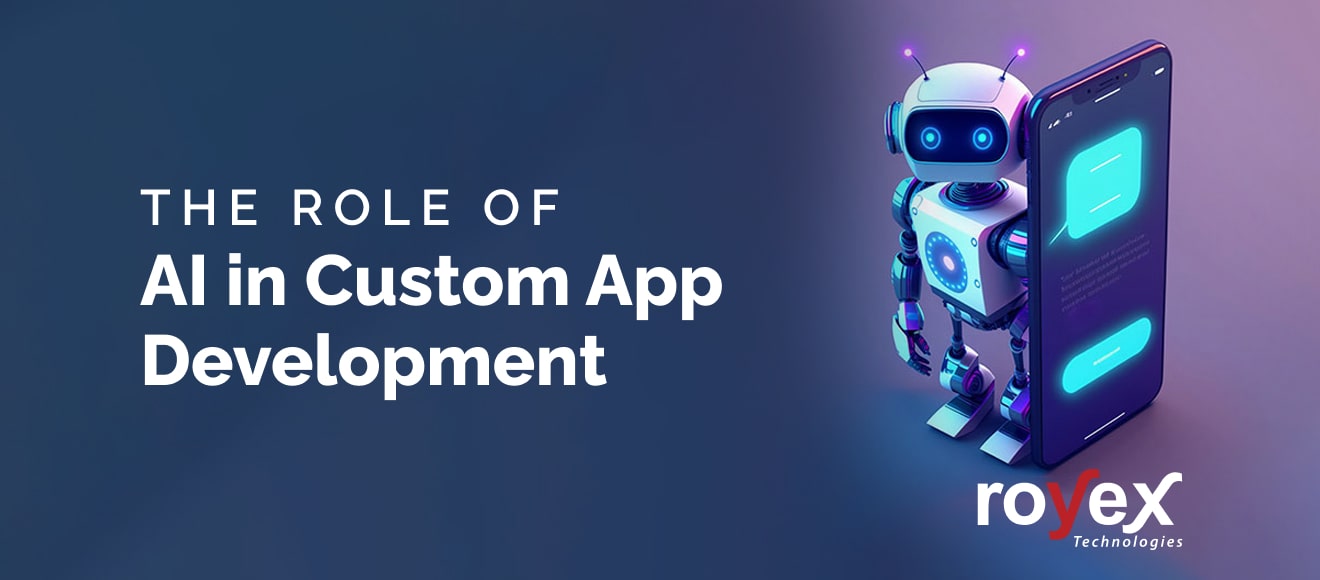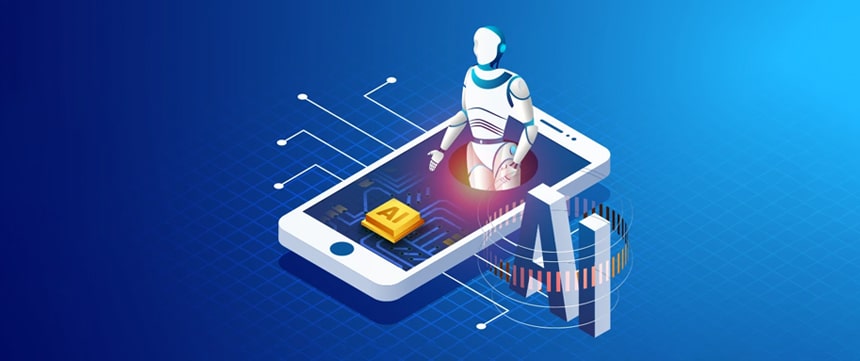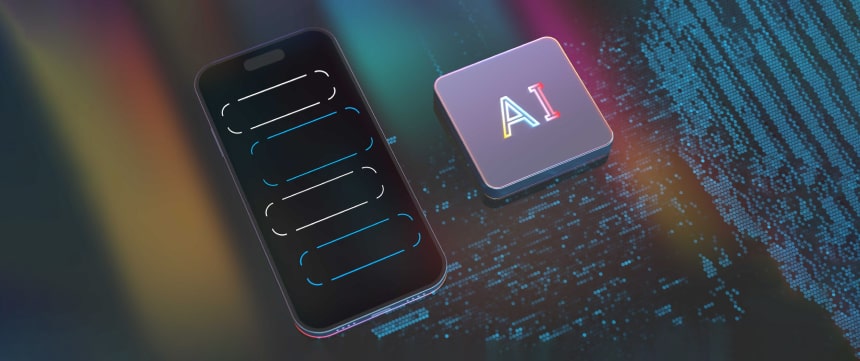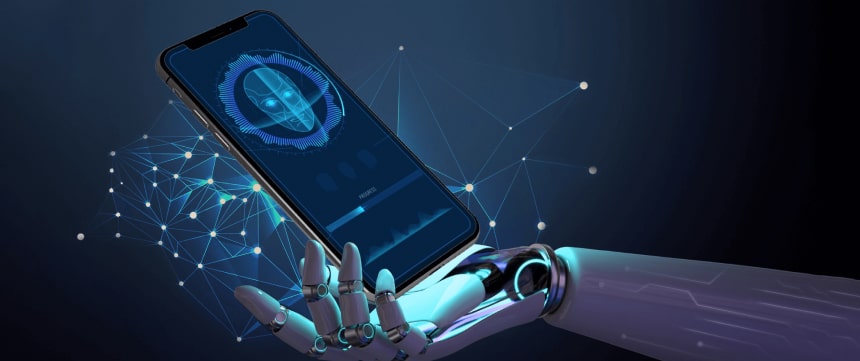
The Role of AI in Custom App Development
When talking of future technologies, one can examine the optimistic outcomes of breakthroughs in fields such as artificial intelligence. We've long since moved on from a time of lowly technology and generic services to a highly automated world where customization is key.
These days, the core of any mobile application we deal with is artificial intelligence (AI), along with related fields like machine learning (ML) and deep learning. AI is not just a buzzword; it is a suite of technologies that can significantly enhance various stages of app development, from initial planning to post-launch maintenance. In this article, we explore the role of AI in custom app development, exploring its benefits, applications, and future potential.
Understanding AI in the Context of App Development

Artificial Intelligence encompasses a range of technologies including machine learning (ML), natural language processing (NLP), computer vision, and more. In the context of app development, AI can be utilized to automate repetitive tasks, provide intelligent insights, enhance user experience, and improve overall efficiency.
Key Components of AI in App Development
Machine Learning (ML): ML algorithms can learn from data and improve over time without being explicitly programmed. This is particularly useful for predictive analytics, personalization, and automating complex processes.
Natural Language Processing (NLP): NLP allows apps to understand and respond to human language, enabling functionalities such as chatbots, voice recognition, and sentiment analysis.
Computer Vision: This AI technology enables apps to interpret and process visual data from the world, facilitating features like image recognition and augmented reality (AR).
Robotic Process Automation (RPA): RPA uses AI to automate repetitive tasks, improving efficiency and reducing the potential for human error.
AI In Existing Custom Apps

To illustrate the transformative power of AI in custom app development, it’s helpful to look at real-world examples where AI technologies have been successfully implemented. These case studies demonstrate how AI can enhance user experience, drive engagement, and streamline operations.
By examining these examples, we gain insight into the practical applications of AI and the tangible benefits it brings to various industries. Let's explore how companies like Netflix, Spotify, and Tesla leverage AI to create cutting-edge solutions that set new standards in their respective fields.
Netflix: Personalized Content Recommendations
Netflix is a pioneer in using AI to personalize the user experience. The streaming giant employs sophisticated algorithms to analyze vast amounts of data related to viewing habits and preferences. Every action a user takes, such as watching, rating, or searching for content, feeds into Netflix's recommendation engine.
The AI system employs collaborative filtering, content-based filtering, and deep learning techniques to make accurate predictions about what users might enjoy. By considering factors like the genres, actors, and directors users favor, Netflix's AI creates a tailored viewing experience. This personalized approach has been instrumental in keeping users engaged, reducing churn, and encouraging longer viewing sessions. The result is a highly satisfied user base that relies on Netflix's recommendations to discover new content, contributing significantly to the platform's success.
Spotify: Dynamic Playlists and Discover Weekly
Spotify has revolutionized music streaming with its use of AI to curate personalized playlists and its standout feature, Discover Weekly. The platform analyzes users' listening history, including song preferences, frequency of listens, and even skips, to generate personalized recommendations.
Spotify's recommendation engine combines collaborative filtering, natural language processing (NLP), and deep learning. Collaborative filtering analyzes the listening habits of similar users to suggest new music, while NLP analyzes song lyrics and descriptions to understand the content's themes and emotions. Deep learning models further refine these recommendations by learning complex patterns in the data.
The Discover Weekly playlist is a prime example of this AI-driven personalization. Every Monday, users receive a curated playlist of songs they've never heard before but are likely to enjoy based on their listening habits. This feature not only enhances user experience by introducing new music but also increases user engagement and loyalty, making Spotify a go-to platform for music discovery.
Tesla: Autonomous Driving
Tesla's self-driving technology showcases AI's potential to transform industries. The company's approach to autonomous driving relies heavily on AI technologies such as computer vision, machine learning, and neural networks. Tesla's vehicles are equipped with a suite of sensors, cameras, and radar that feed real-time data to the onboard AI system.
The AI uses computer vision to interpret and understand the car's surroundings, including identifying objects, lane markings, traffic signals, and pedestrians. Machine learning algorithms process this data to make decisions and navigate complex driving scenarios. Over time, neural networks learn from millions of miles of driving data collected from Tesla vehicles worldwide, constantly improving the system's accuracy and safety.
Tesla's AI-driven approach allows for features like Autopilot and Full Self-Driving (FSD), which enable the car to steer, accelerate, and brake autonomously under specific conditions. This continuous learning and improvement cycle is crucial for advancing towards fully autonomous vehicles. Tesla's innovative use of AI not only enhances the driving experience but also sets new standards for safety and efficiency in the automotive industry.
Duolingo: Adaptive Language Learning
Duolingo, a popular language learning app, leverages AI to provide personalized and adaptive learning experiences. The app uses machine learning algorithms to tailor lessons to individual users' learning styles and proficiency levels. By analyzing user performance and interactions, Duolingo's AI can identify strengths and weaknesses, adjusting the difficulty and content of exercises accordingly.
This adaptive learning approach ensures that users remain challenged but not overwhelmed, promoting effective learning and retention. Duolingo's AI also powers its chatbots, which simulate real-life conversations to help users practice their language skills in a practical context. The integration of AI in Duolingo not only enhances the learning experience but also contributes to its widespread popularity and effectiveness.
MyFitnessPal: Personalized Health and Fitness Tracking
MyFitnessPal, a leading health and fitness app, employs AI to provide personalized diet and exercise recommendations. The app uses machine learning to analyze users' dietary habits, exercise routines, and fitness goals. By processing this data, MyFitnessPal's AI can suggest personalized meal plans, workouts, and track progress over time.
The app also leverages computer vision technology to allow users to log food by simply taking pictures of their meals. This feature uses AI to recognize and analyze the nutritional content of the food, making it easier for users to track their calorie intake accurately. MyFitnessPal's use of AI not only simplifies the process of maintaining a healthy lifestyle but also provides users with actionable insights and personalized recommendations.
Applications of AI in Different Stages of App Development

AI can be utilized throughout the app development lifecycle to enhance efficiency, improve quality, and deliver personalized user experiences. Here’s how AI impacts each stage:
1. Ideation and Planning
During the initial stages of app development, AI can analyze market trends and user needs to identify potential opportunities. AI-powered tools can perform competitive analysis and predict the success of various features, helping businesses make informed decisions about their app’s direction.
2. Design
AI-driven design tools can automate the creation of wireframes and prototypes. By understanding user preferences, these tools can suggest design elements that enhance usability and aesthetic appeal. For instance, tools like Adobe XD utilize AI to streamline the design process.
3. Development
AI can assist developers by generating code snippets, detecting errors, and optimizing performance. Integrated development environments (IDEs) with AI capabilities, such as Visual Studio Code with IntelliCode, provide real-time code suggestions and improve development efficiency.
4. Testing
AI automates the generation of test cases and the execution of tests, significantly reducing the time required for manual testing. AI-driven testing tools can simulate user interactions, identify bugs, and ensure comprehensive coverage, improving the reliability of the final product.
5. Deployment
During deployment, AI can predict the best times to release updates based on user activity patterns. It can also optimize the deployment process to ensure minimal downtime and smooth transitions.
6. Maintenance and Support
Post-launch, AI-powered analytics can monitor app performance and user feedback in real-time. AI chatbots can provide instant support to users, handling common queries and issues, while more complex problems are escalated to human agents.
Benefits of AI in Custom App Development

By integrating AI, developers can achieve greater efficiency, precision, and user satisfaction. Here are some key benefits of AI in custom app development:
1. Enhanced User Experience
AI-powered apps can provide personalized experiences by analyzing user behavior and preferences. For example, recommendation engines in e-commerce apps suggest products based on past purchases and browsing history, enhancing user satisfaction and engagement.
2. Improved Development Efficiency
AI can automate routine coding tasks, such as bug fixing and code optimization, freeing up developers to focus on more complex aspects of app creation. Tools like GitHub's Copilot use AI to suggest code snippets, reducing the time and effort required for manual coding.
3. Intelligent Testing and Quality Assurance
AI can transform the testing phase of app development by automating test case generation and execution. AI-driven testing tools can identify patterns and predict potential issues, ensuring higher quality and more reliable applications.
4. Predictive Analytics
By leveraging ML algorithms, developers can predict user behavior and app performance under different conditions. This enables proactive improvements and helps in making data-driven decisions during the development process.
5. Enhanced Security
AI can enhance app security by detecting and responding to threats in real-time. AI algorithms can analyze patterns to identify unusual activities, providing an additional layer of protection against cyber attacks.
The role of AI in custom app development is multifaceted and transformative. By automating routine tasks, providing intelligent insights, and enhancing user experiences, AI is revolutionizing the way apps are developed and maintained. As AI technology continues to advance, its impact on the app development landscape will only grow, offering exciting possibilities for developers and users alike. Embracing AI in app development is not just an option but a necessity for staying competitive in an increasingly digital world.
Established in 2013, Royex Technologies is a leading mobile app development company in Dubai, that provides innovative solutions for small, medium, and large-scale companies. We specialize in responsive web development, mobile app development, CRM integration, AI solutions for website & mobile applications, and many more. Our extensive experience in mobile app development will help you to take your business to a high level.
Check our portfolio to see our previous works. Contact us via email at info@royex.net or call us at +971566027916 to get started with us.





